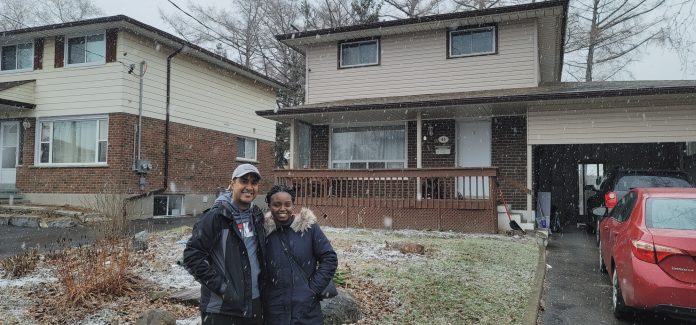After a long week working at a property management company, Lise Ngo, 31, and her fiancé, Dario Luiz Junior, 37, a self-employed drywaller, are back home.
Junior is playing his favourite video game, and Ngo is checking their household budget worksheet. Like many people, she is shocked by how Oshawa’s rent prices have skyrocketed over the past two years.
“It was hard to find something that wasn’t a basement,” she said.” So (the) basement was mostly the only opportunity we had out there, and I think that was an issue for us.”
They used to live in the Toronto area and paid $1,100 per month. After moving to a similar one-bedroom in Oshawa in July 2021, their current rent is $1,500 per month.
“I think that was COVID-19 (that) put us in more of the financial crisis, and to pick up on that financial crisis, a lot of things increased,” said Ngo.
Junior blames the price of new homes.
“It’s so high, and the taxes are higher as well. So, it’s become almost impossible for someone (to) buy a house,” said Junior.
The latest report released by Rentals.ca – a website for apartment rental searches – lists the city of Oshawa as one of the top 20 most expensive cities for rent in Canada.
Ngo and Junior are considering leaving Oshawa.
“So, we’re – definitely – thinking (to) move even tomorrow, but I think the job opportunities also have to be there,” said Ngo.
Lindsay Smith works for Keller Williams Energy Real Estate in Oshawa. He started as a realtor in Durham Region in 1986.
Smith said renters are not the only ones planning to leave Oshawa, so are homeowners.
“We’ve even seen people who are homeowners who decide to sell and move out of the area because it’s too expensive to live here,” he said.
Smith said there are two reasons why rent is expensive.
“So, we’re getting over 200,000 people immigrating to the GTA every year and I think what’s happened is that our government has not been successful in helping people build (an) affordable rental property or any rental properties at all,” he said.
He added that landlords can take advantage of tenants and increase the rent because of the imbalance between supply and demand.
Smith said renters could pressure the provincial government to make changes to create more rental stock.
“Flooding the market, then all rents would come down, and the landlords would have less control about an increase in the rents,” said Smith. “But the government makes it so difficult for investors to build property.”
Commercial property renters are also struggling to keep their doors open.
Alexander Neofotistos, manager of the family-owned restaurant Bang Bang Burrito, said it’s difficult to maintain – or even break even – the restaurant’s finances.
“It all costs money to keep the tablets on, to get the bottles, the plastics, the labels, Internet, paper, pens, employees, food, everything – it all adds up,” Neofotistos said. “So, that on top of rent increasing, it makes it very hard to profit anything at all.”
Neofotistos said the restaurant had to adjust the food prices to make up for the increased rent.
“The rent went up $400 a month, which is already cutting into everything that we (are) making as it is,” he said. “We’ve had to increase the price of food (by) about $2.”
Neofotistos would like to see rent based on a rent cap.
Tom Goodeve, director of planning services at the City of Oshawa, said the city cannot impose a rent cap because the province is responsible.
“Oshawa is not in the affordable housing business,” he said, “and neither are any of the eight municipalities that together comprise Durham (Region).”
He said the region needs more assistance from the provincial and federal governments.
John Henry, regional chair and CEO of Durham Region, said a rent cap isn’t necessary if the supply of homes increases.
“Once you have more homes and people, rents will have to go down, (and) people want to fill those homes and collect the rent,” he said.
Henry said Durham Region is drawing people’s attention from other provinces and countries due to job opportunities at places such as General Motors and Ontario Power Generation.




